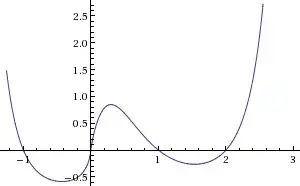I have the exponential equation $\vert x\vert^{x^2-2x} = 1$, but how do I solve it?
-
Interesting function, I like the plot http://www.wolframalpha.com/input/?i=abs%28x%29%5E%28x%5E2-2*x%29 – CDspace Aug 12 '14 at 15:13
-
What the heck is the point of editing posts that are nearly two a half years old???? – fleablood Dec 20 '16 at 23:33
3 Answers
Either $x = \pm 1$ (so the value of the exponent doesn't really matter)
Or $x^2 -2x = 0$ but $x \neq 0$ i.e. $x = 2$ (any non-zero number to the zero-th power is one)
- 12,296
Hint:
note that your equation is equivalent to:
$$(x^2 - 2x) \, \log{|x|} = 0,$$ what can we say about a product of two factors if it is equal to zero?
Edit:
Suggested by @CDspace, here's a plot of $f(x) = |x|^{x^2-2x} - 1$ where we can visually see the solutions of $f(x) = 0$:

Pretty cool!
- 7,517
-
-
3
-
2You can proceed by inspection, as @Darth Greek has shown in his answer, numerically or graphically (by drawing a graph of the function). Cheers! – Dmoreno Aug 12 '14 at 10:34
-
1
-
Sure it's not, since $f$ is not defined at $x=0$. I'm sure the OP noticed. – Dmoreno Aug 19 '14 at 16:02
I believe $x=0$ is a solution, because $x^x$ is continuous as $x$ approaches $0$. Consider $\lim_{x \to 0}x^x$. Let $$f(x_n)=\bigg(\frac{1}{x}\bigg)^{\frac{1}{x}}$$such that $$ y=\bigg(\frac{1}{x}\bigg)^{\frac{1}{x}} $$Then $$ ln(y)=\frac{1}{x}ln\bigg(\frac{1}{x}\bigg)=\frac{1}{x}(ln1-lnx)=\frac{1}{x}(0-lnx)=-\frac{lnx}{x} $$Now, using L'Hopital's rule, $$ \lim_{x\to\infty}\bigg(-\frac{lnx}{x}\bigg)=\lim_{x\to\infty}\bigg(-\frac{\frac{1}{x}}{1}\bigg)=\lim_{x\to\infty}\bigg(-\frac{1}{x}\bigg)=0 $$ Now, $$ \lim_{x\to\infty}f(x_n)=\lim_{x\to\infty}y=\lim_{x\to\infty}e^{lny}=\lim_{x\to\infty}e^{-\frac{1}{x}}=e^0=1 $$Therefore, $$ 0^0=\lim_{x\to 0}x^x=\lim_{x\to 0}f(x)=\lim_{x\to\infty}f(x_n)=1 $$The solutions given by the graph provided by @CDspace are therefore correct: {-1,0,1,2}
- 598
- 5
- 11
-
1The problem is that the function $f(x) = |x|^{x^2-2x}$ isn't well-defined at $x=0$. We can define a continuous function that extends $f()$ to $x=0$, but it's not necessarily true to say that that is the value of $f$ at $x=0$. (Which isn't to say that it's not true; this is a matter of convention since just saying $|x|^{x^2-2x}$ isn't sufficient to define a function in its own right.) – Steven Stadnicki Aug 13 '14 at 19:47
-
1$0^0$ is not defined. For this specific function it's limit for $x\to 0$ indeed $0$ and function $|x|^{x^2-x}$ can be extended continuously for $x=0$. But formally speaking this function is not defined in $0$ and then $0$ cannot be a solution. As I see my remark almost completely coincides with @Steven Stadnicki. – Alexander Vigodner Aug 13 '14 at 19:48
-
1That's a subtle piece of business, but I see your point. The slope of this function $[(2x−2)ln|x|+x-2]|x|^{x^2−2x} =\infty$ at $x=0$ (again assuming $0^0=1$), which is also evident in the graph. We have a convention of saying that an infinite slope isn't well-defined. Also, $0^0=0^{c−c}=\frac{0^c}{0^c}=\frac{0}{0}$, the very definition of "not well-defined." I, however, am leery of convenient conventions. How can we look at the graph of this function and say that it isn't defined at all at zero when the computer easily graphed it? Is there a difference between "defined" and "well-defined?" – atomteori Aug 13 '14 at 20:38
-
Please forgive me if I betray my ignorance with this question, but I guess my actual problem is this: $\frac{\xi}{\xi}=\frac{x}{x}=\frac{i}{i}=\frac{3}{3}=1$ This is well-defined. $\frac{0}{0}\neq 1$ despite the fact that the only difference is a change in the type of squiggly line we are using in our fraction. Were I to convince a majority of mathematicians that $\frac{0}{0}=1$, would I have changed the convention? Is zero really a number, or is it a different concept altogether? – atomteori Aug 13 '14 at 21:11
-
@atomteori $0$ is different to any other number in the sense that it's the neutral element of the adition in the ring $\mathbb{R}$. That means that $0$ has no multiplicative inverse. $x^0$ is technically defined as $x^1·x^{-1} = x^{1-1} := x^0$. This asumes $x$ has a multiplicative inverse, and $0$ does not. – Darth Geek Aug 20 '14 at 17:54